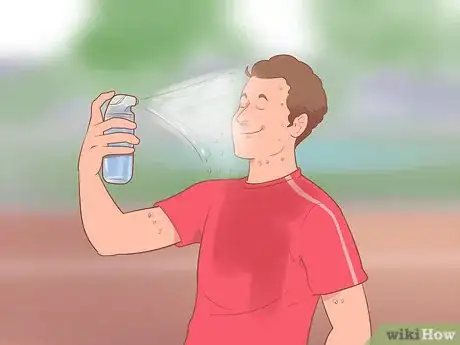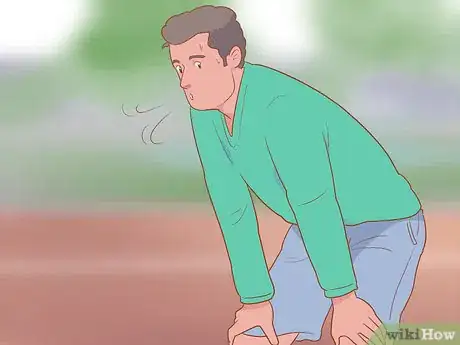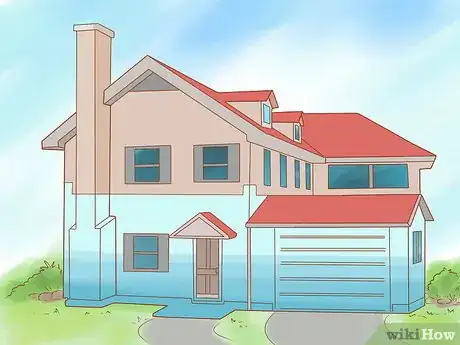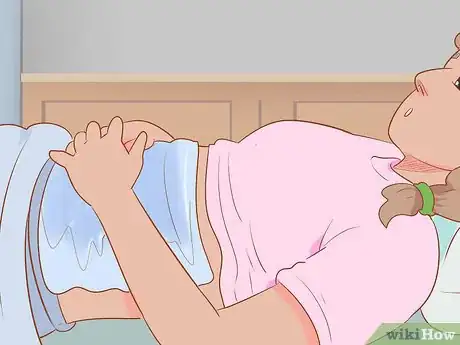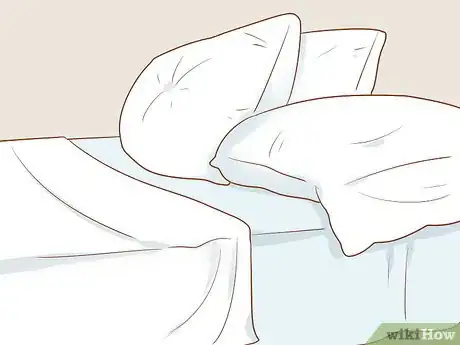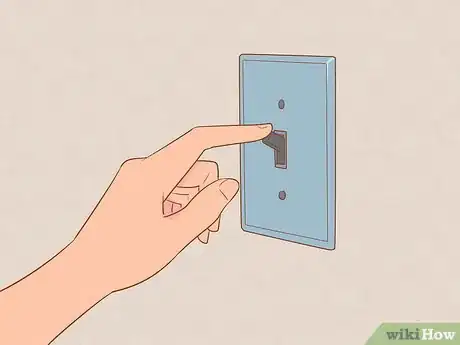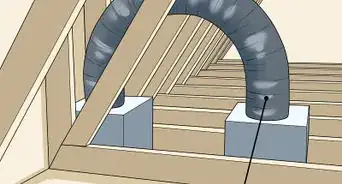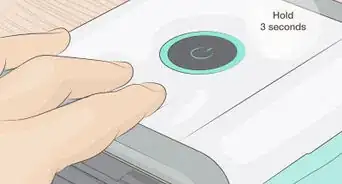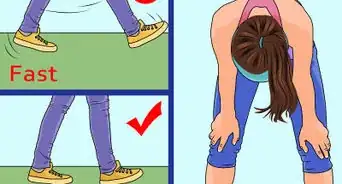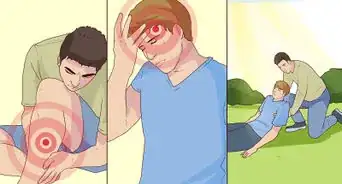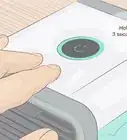This article was co-authored by Victor Belavus. Victor Belavus is an Air Conditioning Specialist and the Owner of 212 HVAC, an air condition repair and installation company based in Brooklyn, New York. In addition to HVAC and air conditioning units, Victor also specializes in furnace repair and air duct cleaning. He has over 10 years of experience working with HVAC systems.
There are 12 references cited in this article, which can be found at the bottom of the page.
This article has been viewed 29,386 times.
Maintaining a healthy body temperature is important, especially during the hot days of summer. If you’re frequently outside during the day, you’ll risk overheating (and potentially having heat exhaustion) if you don’t keep cool.[1] Similarly, it can be challenging to keep cool indoors and at night during a heat wave. Focus on staying hydrated and allowing cool air to circulate to move heat away from your body. Also, use lightweight clothing and bedclothes to stay cool during both day and night.[2]
Steps
Cooling off Outdoors
-
1Stay hydrated by drinking water when you’re outside. Water is crucial. It allows your body to cool itself down and keep its interior temperature regulated.[3] If you don’t stay hydrated—especially if you’re working or playing sports outdoors in the sun—you’re likely to get dehydrated. Adult men should drink at least 15.5 cups (3.7 L) of water each day, while adult women should drink 11.5 cups (2.7 L).[4]
- If you don’t have access to water, other liquids like coffee, tea, sports drinks, juice, or soda are better than nothing. Coffee can in fact dehydrate your body over the course of a day, though.
-
2Mist yourself with a small water-filled spray bottle. If you’re outdoors for the day and the heat is getting to you, spray the exposed skin on your face, arms, neck, and torso with water from a small spray bottle. Not only will the cool water feel good against your warm skin, but, as air circulates and blows across the dampened surfaces of your body, it will carry the heat away.[5]
- If you’re concerned that friends or family members may be overheating as well, plan ahead and bring a water-filled spray bottle for them.
Advertisement -
3Slow down your physical activity if you’re overheating. It’s easy to overheat when you’re running, working, playing sports, or otherwise being active outside. To cool off, simply stop the physical activity and take a break. If possible, sit down in a shady location. Drink some water and wait for 20-30 minutes until your body has had a chance to cool down. You can tell that you’re overheating if you start to feel dizzy, faint, or find yourself sweating nonstop.[6]
- If you don’t stop performing a physical activity when you feel your body start to overheat, you’ll risk heat exhaustion and, in extreme cases, heat stroke.
-
4Wrap a wet towel or bandana around your head. If you’re spending time outdoors and need to cool down in a hurry, run cool water over a hand towel or bandana. Wring any excess water out of the fabric and tie the towel or bandana around your head. Also, try wetting your t-shirt around the neck and chest. The cool water will quickly lower your body temperature, even on the hottest days.[7]
- The towel or bandana will dry out in 1-2 hours, so reapply water as needed.
- This is also a useful trick if you’re driving cross country without air conditioning.
-
5Wear lightweight, breathable clothing to stay cool. The clothing you wear can have a large effect on your overall body temperature. If you’re outside during a hot summer day, plan ahead and wear lightweight. This will allow your body to lose heat throughout the day. Also wear light-colored clothing that won’t absorb heat from the sun’s rays. Lightweight fabrics include cotton, linen, gingham, and seersucker.[8]
- So, instead of wearing dark blue jeans and a nylon jacket, try wearing cotton shorts and a white linen shirt.
Keeping Yourself Cool Indoors
-
1Run the air conditioning in your home at night. This may seem intuitive, but if your AC isn’t on, your home is going to heat up rapidly during a sunny summer day. So, turn the AC on to cool down your living area. Rather than running the AC during the heat of the day, try cooling down your home as much as possible at night.[9] [10]
- If you’re trying to save money on your electric bill, set your AC to 3-4 degrees warmer than you’d usually have it set.
-
2Apply a wet cloth to key cooling spots on your body. Due to the location of blood vessels under your skin, there are a few locations on your body that have a large effect on your overall temperature. To cool down in a hurry, wet a bandana or washcloth with tepid water, then wring it out so it’s not dripping wet. Hold the cloth to 1 or more of these cooling spots for 5-10 minutes. Try holding the wet cloth to your wrists, neck, inner elbow, groin, inner knee, or feet.[11]
- If you’re fully dressed, try taking off your socks and shoes so you can apply a wet cloth to your feet and ankles.
-
3Place 2-4 fans in windows to circulate a cross breeze. Window fans don’t cool down air, but they do bring in outdoor air and allow it to circulate through your home. Open a couple of windows on opposite sides of the house in the evening, and set 1 box fan or swiveling fan in front of each one. Also, try putting 1-2 fans in hallways or doorways to circulate outdoor air through the rooms of your home.[12]
- The moving air through your home will also evaporate sweat from your skin, which lowers body temperature.
-
4Keep the shades closed during the day and open them in the evening. Shades, blinds, or curtains can have a large effect on the overall temperature of your home. Shut them during the heat of the day—usually from 10:00 am to 3:00 pm—to prevent the sun’s rays from heating up your home. Then, once the sun has set and the air outside is cooler than inside, open the shades and windows.[13] [14]
- This will allow the warm air inside to escape and let cool outside air come in.
-
5Stay on lower floors to avoid hot areas in your home. Since heat rises, the highest floor in your home will be the warmest on a sunny day. To keep yourself out of the heat, spend as much time as possible on the cooler lower floor of your home, whether it’s a finished basement or the ground floor. As the upper floor(s) heat up, the lower floor will remain relatively cool.
- If you live in a home with a single floor, this step won’t apply to you.
Cooling Down to Sleep at Night
-
1Take a cool shower about 60 minutes before bed. The water you shower with doesn’t need to be freezing cold, but should be on the chilly side of lukewarm. Even a quick 5-minute shower under cool water will wash away accumulated sweat and grime from the day and will quickly drop your core body temperature.[15] [16]
- Not only will the cool water help you lose some body heat, but the shower itself will calm you down and help ready your body for falling asleep.
-
2Place 1-2 damp hand towels over your torso when you go to bed. Run cold tap water over a couple of hand towels shortly before you go to bed. Wring as much water as you can out of the towels. They should be slightly damp, not dripping wet. Then, when you lay down to sleep, place the damp towels over your chest and stomach. The water will cool down your skin and allow you to fall asleep quickly.[17]
- Then, when you get up in the morning, re-wet the hand towels and place them in your refrigerator so they’ll be cool later that night.
-
3Sleep under lightweight sheets to stay cool all night. Light, breathable sheets will allow your body to cool off and lose its built-up heat overnight. If you have a choice between different types of material, cotton sheets are typically the thinnest and most breathable. Try sleeping under just a top sheet on hot nights to keep cool.[18]
- If you’re using sheets made of heavier and less breathable materials like flannel, satin, or silk, you’ll end up overheated and covered in sweat partway through the night.
-
4Go to bed wearing little clothing and sleep alone. When the weather starts to heat up, swap out your warm wintertime pajamas for light, breathable cotton night clothes. Try sleeping in as little as possible: for example, shorts and a t-shirt should be enough.[19] Sleeping alone in a bed will also help you stay cool since you won’t be absorbing another person’s body heat.
- If sleeping alone is impractical, make sure that you and your partner sleep at opposite sides of the bed. Cuddling or sleeping near one another will raise both your and your partner’s body temperature.
-
5Turn off the bedroom lights 1-2 hours before your bedtime. Lightbulbs produce heat, and if you leave the lights on in your bedroom for hours before you go to bed, you’ll find yourself trying to sleep in a warm room. To cool down your bedroom turn the lights off a couple of hours before you go to sleep. A cool bedroom will lower your body temperature and help you sleep better.[20]
- Turning the lights off at night will also help you get to bed earlier since you’ll be less inclined to stay up late in the dark.
Expert Q&A
-
QuestionWhen should I use a dehumidifer?
 Victor BelavusVictor Belavus is an Air Conditioning Specialist and the Owner of 212 HVAC, an air condition repair and installation company based in Brooklyn, New York. In addition to HVAC and air conditioning units, Victor also specializes in furnace repair and air duct cleaning. He has over 10 years of experience working with HVAC systems.
Victor BelavusVictor Belavus is an Air Conditioning Specialist and the Owner of 212 HVAC, an air condition repair and installation company based in Brooklyn, New York. In addition to HVAC and air conditioning units, Victor also specializes in furnace repair and air duct cleaning. He has over 10 years of experience working with HVAC systems.
Air Conditioning Specialist When it's really hot out, dryer air will feel more comfortable. Keep the dehumidifier in your bedroom with doors closed at night.
When it's really hot out, dryer air will feel more comfortable. Keep the dehumidifier in your bedroom with doors closed at night.
Warnings
- If someone you’re with starts sweating uncontrollably and speaks or acts in a way that seems delirious, they may be experiencing heat exhaustion. Get them to sit down in the shade and drink water to cool down.[21]⧼thumbs_response⧽
References
- ↑ https://www.mayoclinic.org/diseases-conditions/heat-exhaustion/symptoms-causes/syc-20373250
- ↑ https://www.cdc.gov/nceh/features/extremeheat/index.html
- ↑ Victor Belavus. Air Conditioning Specialist. Expert Interview. 6 May 2020.
- ↑ https://www.mayoclinic.org/healthy-lifestyle/nutrition-and-healthy-eating/in-depth/water/art-20044256
- ↑ https://www.mayoclinic.org/healthy-lifestyle/fitness/in-depth/exercise/art-20048167
- ↑ https://www.mayoclinic.org/healthy-lifestyle/fitness/in-depth/exercise/art-20048167
- ↑ https://familydoctor.org/condition/heat-exhaustion-heatstroke/
- ↑ https://www.cdc.gov/nceh/features/extremeheat/index.html
- ↑ Victor Belavus. Air Conditioning Specialist. Expert Interview. 6 May 2020.
- ↑ https://www.cdc.gov/nceh/features/extremeheat/index.html
- ↑ https://www.mayoclinic.org/healthy-lifestyle/fitness/in-depth/exercise/art-20048167
- ↑ https://www.nrel.gov/docs/fy01osti/29513.pdf
- ↑ Victor Belavus. Air Conditioning Specialist. Expert Interview. 6 May 2020.
- ↑ https://edition.cnn.com/2020/05/24/health/how-to-stay-cool-without-air-conditioning-wellness/index.html
- ↑ Victor Belavus. Air Conditioning Specialist. Expert Interview. 6 May 2020.
- ↑ https://www.healthywa.wa.gov.au/Articles/S_T/Sleeping-in-very-hot-weather
- ↑ https://www.healthywa.wa.gov.au/Articles/S_T/Sleeping-in-very-hot-weather
- ↑ https://www.bbc.com/news/health-49072212
- ↑ https://www.healthywa.wa.gov.au/Articles/S_T/Sleeping-in-very-hot-weather
- ↑ https://www.energy.gov/energysaver/save-electricity-and-fuel/lighting-choices-save-you-money/when-turn-your-lights
- ↑ https://www.mayoclinic.org/diseases-conditions/heat-exhaustion/diagnosis-treatment/drc-20373253
About This Article
If you need to cool yourself down in the summer months, try holding a wet cloth to your wrists, neck, groin, or feet. This can help you cool down since all the blood vessels under your skin in those areas. For a quick cool down, take off your socks and shoes and wrap a wet cloth around your feet and ankles. During the day, you can keep your house cooler by closing your blinds from 10:00 am to 3:00 pm to prevent the sun’s rays from heating up your home. Once the sun has set, open your shades and windows to let hot air escape and cool air come in. To stay cool when you’re outdoors, soak a towel or bandana in cool water, wring it out, and wrap it around your head. For more advice, including how to stay cool as you sleep, scroll down!


